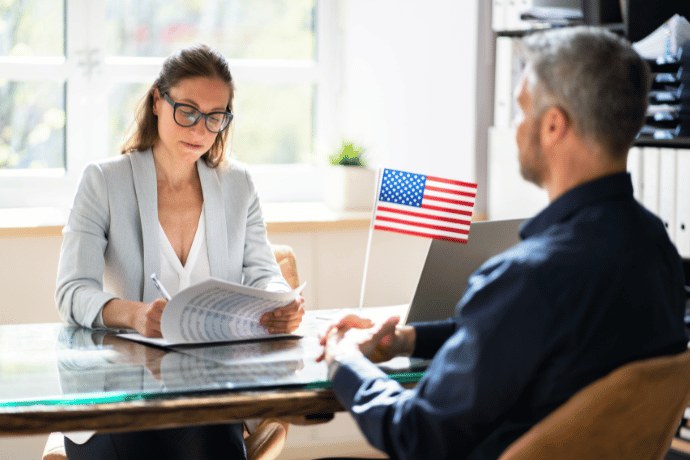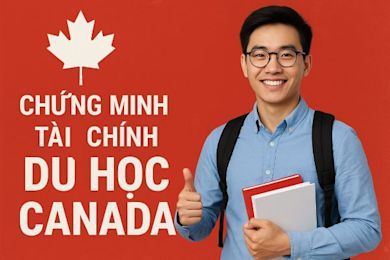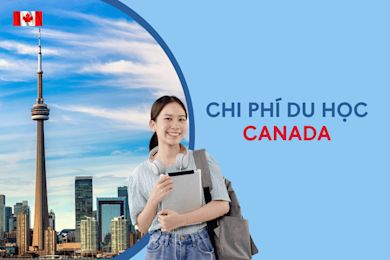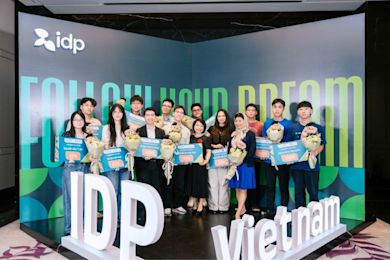Topics covered
- Published: 15 September 2025
- Updated: 20 July 2025
Many parents whose children are studying in the U.S. often want to explore a new environment, visit, share important milestones with their children such as graduation ceremonies, or simply encourage their children in the early days away from home. Owning a US tourist visa (B1/B2) is the "passport" that parents must have to set foot in this country. In this article, IDP will learn with parents the conditions for applying for a US tourist visa, the documents to be prepared, the cost, as well as useful interview experiences to be more confident in the application process and improve the success rate.
1. Overview of US Tourist Visa
1.1. What is a US tourist visa?
The U.S. tourist visa, also known as the B1/B2 visa, is a short-term visa for foreign nationals who wish to enter the U.S. for non-settlement purposes. This is the most popular type of visa for those who want to come to the U.S. for a short time, including parents visiting their children to study abroad.
B1 visa: For those who come to the U.S. for short-term business purposes, attend scientific conferences or seminars, educate, sign contracts, or participate in professional events.
B2 visa: For tourism purposes, visiting relatives (e.g., parents visiting their children studying in the U.S.), medical treatment, or participating in social activities, cultural exchanges.
B-1/B-2 visas: A combination of both purposes – work and travel in the same trip.
1.2. How long is a US tourist visa valid for?
Usually, U.S. tourist visas (B1/B2) are issued for up to 12 months, allowing the holder to enter the country multiple times during this period. This is especially convenient for parents because they can visit their children in the United States many times a year, without reapplying for a visa.
So, how long can a US tourist visa stay? Basically, the maximum length of stay per entry is not fixed. Upon arrival at the U.S. border crossing, Customs and Border Protection (CBP) officers will decide and stamp the number of days you are allowed to stay. Normally, visitors, including parents, are allowed to stay for up to 6 months, which is enough for parents to visit, attend graduation ceremonies or take care of their children for a short time.
Join the IDP student community
Connect with peers and student ambassadors to hear real experiences, tips, and advice about studying abroad.

2. Conditions for applying for a US tourist visa
When applying for a B-1/B-2 visa, parents need to prove to the Consulate that their trip is short-term only. Under the U.S. Citizenship and Immigration Act, all B-1/B-2 visa applications are considered to be intended for long-term residency by default. So, you must provide evidence to prove the opposite, including:
Clear purpose of the trip:
The applicant should clearly state what the purpose of his or her application for the US B1/B2 visa is, and provide a specific length of stay. In the case of parents, the purpose is usually to visit their children who are studying in the US or to stay for a certain period of time. The declaration of specific and clear purposes will help increase the reliability of the dossier.
Solid financial ability:
Parents need to prove that they have enough finances to pay for the entire trip (airfare, accommodation, living expenses in the US)
Proof of commitment in Vietnam:
This is a key factor to prove to the Consulate that the parent will return after the end of the trip. Parents can prove through stable employment, family, property, or social/economic constraints in Vietnam to ensure you will return from your trip.
3. What documents are required for a US tourist visa application?
When applying for a visa, you will need to pay the prescribed fee and prepare the following basic documents:
Electronic Nonimmigrant Visa Application Form (DS-160).
Parents need to complete the application form and submit it online before scheduling an interview at the U.S. Embassy or Consulate.
The passport must be valid for at least 6 months
after the expected date of departure from the US (except for special cases agreed between the US and some countries). If there are dependents in the passport, each person who wants to apply for a visa must apply for a visa.
The 2 x 2-inch (51 x 51 mm) card photo was
taken within the last 6 months, complying with the standards for size and content. In the case of visa extension, the newly submitted photo must be different from the photo used in the old visa.
If the visa is approved, some cases may require an additional
visa issuance fee
(called a reciprocal fee), depending on the applicant's nationality. And if parents are required to pay before the interview, they will also need to provide a receipt of payment of the application fee.
3.1. Supporting documents during the visa interview
During the interview, the consular officer will review the application based on various factors such as work, family situation, study or travel plans, and ties in Vietnam. Each dossier will be independently evaluated in compliance with the law. In addition to the basic documents, parents should additionally prepare:
An invitation/confirmation letter from the child or a confirmation of the child's study at a school in the United States to confirm the purpose of coming to the United States.
Transcripts and academic results of children at American schools
Financial proof documents: savings books, payrolls, labor contracts, assets.
Documents that are binding in Vietnam: employment contract, proof of family relationship, or bank account
3.2. Important notes in the process of preparing documents
Do not submit false documents or false information
If parents are concerned about confidentiality, bring the papers in a sealed envelope to the interview; The Embassy or Consulate will keep your information confidential.
Only bring documents directly to the interview, do not send any supporting documents by fax, email or post.
The visa approval is based on the constraints of parents in Vietnam (family, work, property, etc.), not guarantees from relatives in the US. An invitation letter or financial sponsorship letter is not required and is not a determining factor in whether a visa is approved or not.
4. Cost of applying for a US tourist visa
The cost of applying for a U.S. tourist visa (B-1/B-2 visa) includes a mandatory and non-refundable fee, known as the MRV fee. This fee is regulated by the U.S. Consulate and may change from time to time.
4.1. Visa approval fee (MRV fee)
Up to now, the official approval fee for the US tourist visa (B1/B2) is 185 USD (about 4,995,000 VND). Parents must pay this fee for the application to be reviewed. This is a mandatory fee and will not be refunded, even if the visa application is rejected.
How to pay: Parents can pay online through the system or at designated banks according to the instructions on the website of the U.S. Embassy and Consulate General in Vietnam
(Current Consulate Exchange Rate: 27,000 VND = 1 USD. Effective until: 13/09/2025).
4.2. Service and dossier costs that may be incurred
In addition to the visa processing fee, parents may have to pay the following additional amounts:
Travel costs: Parents will need to prepare additional travel and accommodation costs on the day of the interview if they are far from Hanoi or Ho Chi Minh City. HCM.
The cost of a medical examination if required (usually for purposes other than short-term travel).
5. Where to apply for a US tourist visa?
In Vietnam, parents can apply and interview at:
In Hanoi:
Consular Section, U.S. Embassy.
The Nonimmigrant Visa Division.
Address: No. 7 Lang Ha, Hanoi, Vietnam
Hotline: (+84) 024 3850 5000
In Ho Chi Minh City:
U.S. Consulate General.
Address: No. 4 Le Duan, Saigon Ward, Ho Chi Minh City.
Hotline: (+84) 28 3520-4200
Email: scongenhcmc@state.gov
6. Experience in answering visa interview questions to the US
The interview is the decisive step in the visa application process. Here are the experiences parents should not ignore:
6.1. Thorough Preparation and Honest Answers
Parents must master all of the information provided on the DS-160 form and the accompanying documents. All answers in the interview must match the records, and information should not be fabricated or concealed because consular officers can easily detect inaccurate information.
6.2. Focus on clearly stating the purpose of the trip
These are the two most important factors that consular officers will focus on exploiting.
Trip purpose: Answer clearly and accurately about the purpose of the trip. For example, "I'm going to the U.S. to visit my child who is studying at school..., or to attend a graduation ceremony, and will be back in 3 months."
Proof of commitment in Vietnam: Parents must show that they have strong bonds to ensure that they will return from the trip. Attachments can be stable jobs, family, valuable assets.
6.3. Calm and confident attitude
Always look straight throughout the interview process, keeping a confident, relaxed, and polite attitude. Dressing neatly and dressing politely will make a good impression on consular officers.
7. FAQs – Frequently Asked Questions About US Tourist Visa
7.1. Is it difficult to get a visa to the US?
Applying for a US visa will become much easier if parents are well prepared from the application, the purpose of the trip to how to answer the interview. To ensure accurate information, parents can refer directly to the US Embassy/Consulate. or contact US visa service consultants to visit relatives such as IDP.
7.2. When should I make an appointment for a visa interview?
The majority of U.S. visa applications are processed and results are returned in just a few business days. However, there are still some cases that require additional administrative processing, and parents will not know in advance whether their case is among them, nor how long the processing time will take. So, to be on the safe side, apply for a visa at least 6–8 weeks before your intended departure date. And don't rush to book a flight or hotel until the visa is issued.
7.3. How long can I stay in the U.S. with a U.S. tourist visa?
Nonimmigrant visas allow parents to enter the U.S. through an airport or seaport. However, how long to stay will be decided by U.S. Customs and Border Protection (CBP) officers at the time of entry.
7.4. What is the Visa by Mail Extension Program?
This program allows parents to renew their visas without having to go to an interview in person. However, in some cases, the Consulate may still ask you to come for an interview to verify your visa eligibility. Typically, renewal applications will be processed and returned in about 2 weeks.
7.5. I'm going on a trip with my family. So can I apply for a joint family visa?
Not. Each member attending the immigrant visa interview must submit a separate DS 260 form, including the child.
7.6. Can I fill out the DS-160 form in my native language?
Not. All answers in the application must be presented in English and use English characters (except in some special cases). If the parent applies in another language, the application will be denied. At that time, parents will have to log in to the CEAC Online Application Center again to fill in all the information in English.
7.7. Do all nonimmigrant visa applicants have to go to the Embassy or Consulate for an interview?
Yes, most applicants must participate in an interview. In the case of visa extensions, parents may be exempt from interviews if they are eligible.
7.8. What information do I need to provide about social media when filling out the DS-160 form?
As of May 31, 2019, the U.S. Department of State has added new requirements to the immigrant visa and nonimmigrant visa application forms. Accordingly, most applicants must declare their account name or access ID to social networks they are using or have used in the past 5 years such as Facebook, Twitter and Instagram.
IDP always assists you in preparing a complete and professional application for a US tourist visa
IDP always assists you in preparing a complete and professional application for a US tourist visa
Applying for a US tourist visa can make many parents worried because of the strict process and strict requirements. However, if you understand the conditions, prepare your documents carefully, be confident in the interview and have the companionship of experts, the journey will become much easier. Hopefully, the information in the article has helped parents have a clearer view of the procedure for applying for a US tourist visa to plan their journey conveniently and safely.
IDP always accompanies parents in the process of applying for a US visa to visit their children, and at the same time provides comprehensive services for families with children studying in the US, including:
Advice on choosing a school and major that suits your personal goals.
Assist in preparing accurate study abroad documents and visas, increasing the success rate.
Attractive scholarship information from hundreds of American universities. IDP is the official admissions representative of nearly 250 leading prestigious schools in the US, offering a wide selection of scholarships to study in the US for Vietnamese students.
Essential support services: insurance registration, accommodation finding, bank account opening, guardianship services and international SIM purchase.
Pre-departure orientation, which prepares you for knowledge and psychology before you fly.
with IDP today to prepare for a smooth and safe journey to the US to visit your children.
Free consultation hotline: 19006955
One account for all your study abroad needs
Create your profile and unlock a wide array of features including personalised recommendations, fast-tracked applications and much more.










